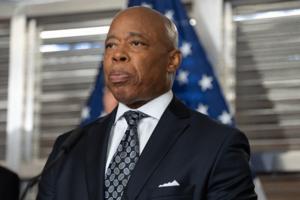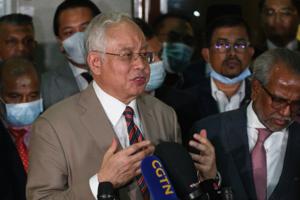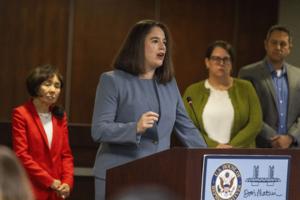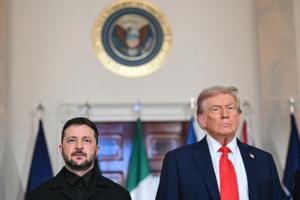Current News
/ArcaMax

Mayor Adams looks to veto roughly 20 more NYC Council bills on key issues: sources
NEW YORK — Before he leaves office in less than a week, Mayor Eric Adams is likely to veto a bevy of City Council bills that carry significant policy implications for issues ranging from housing development and street vending to immigration and police accountability, sources with knowledge of the matter tell The New York Daily News.
Adams, ...Read more

Malaysia fines ex-PM Najib $2.8 billion for 1MDB scandal, adds jail time
Former Malaysian Prime Minister Najib Razak, already jailed for his role in the 1MDB scandal, faces another 15 years in prison and a fine of 11.4 billion ringgit ($2.8 billion) after being convicted of abuse of power and money laundering in connection with the failed state-run fund.
Judge Collin Lawrence Sequerah announced the sentence after ...Read more

Ashlee Buzzard denies murdering daughter Melodee, won't face death penalty
California mom Ashlee Buzzard pleaded not guilty in the murder of her daughter Melodee during a Friday court hearing in which Santa Barbara prosecutors said they would not seek the death penalty.
The 40-year-old defendant is accused of fatally shooting the 9-year-old girl, whose body was found in a remote area of southern Utah on Dec. 6 ...Read more

Courtroom gasps as Ashlee Buzzard pleads not guilty to murder of 9-year-old Melodee
LOS ANGELES — Ashlee Buzzard, the California mother accused of killing her 9-year-old daughter, Melodee Buzzard, pleaded not guilty Friday morning during a brief but emotional arraignment in Santa Barbara County Superior Court.
Buzzard, 40, appeared in custody for the hearing, where a judge formally arraigned her on charges of first-degree ...Read more

Winter storm buries Wrightwood, drenches Southern California: 'All it is is rock and mud,' resident says
LOS ANGELES — The Gamboa family isn’t quite sure how they’re going to get back into their home in Wrightwood.
When a powerful atmospheric river began drenching Southern California this week, they were forced to leave as the hills around them dissolved into a river of mud and debris, which by Friday was drying and hardening into a 3-foot ...Read more
News briefs
Patel says FBI headquarters to ‘permanently close’ with move
FBI Director Kash Patel said the agency’s historic-but-aging headquarters in Washington would be “shut down permanently” as he shifts personnel into the building once occupied by the now-defunct U.S. Agency for International Development.
“After more than 20 years of ...Read more

Local Massachusetts police department applauds itself for 'significant role' in locating Brown, MIT shooter
BOSTON — A local Massachusetts police department is applauding itself for playing a “significant role” in tracking down the vehicle that the accused Brown University mass shooter allegedly drove to New Hampshire as he tried to evade authorities.
The Waltham Police Department says its detectives “identified critical information” that ...Read more

California withdraws lawsuit challenging Trump's $4 billion high-speed rail funding cut
SACRAMENTO, Calif. — California this week withdrew its lawsuit against the Trump administration over the termination of about $4 billion in federal funding for its high-speed rail project, citing the federal government’s unreliability as the reason for the decision.
The development follows a lawsuit filed in July, when California sued the U...Read more

Patel says FBI headquarters to 'permanently close' with move
FBI Director Kash Patel said the agency’s historic-but-aging headquarters in Washington would be “shut down permanently” as he shifts personnel into the building once occupied by the now-defunct U.S. Agency for International Development.
“After more than 20 years of failed attempts, we finalized a plan to permanently close the FBI’s ...Read more

2 ski patrollers caught in avalanche at California's Mammoth Mountain after big storm
For the second time in less than a year, a pair of ski patrollers at Mammoth Mountain have been caught in an avalanche after a major snowstorm.
At about 7:30 a.m. Friday, before the resort in eastern California opened, the two were performing "avalanche mitigation work" when a sudden slide occurred on Lincoln Mountain, according to Joani Lynch,...Read more

After Trump strike on terrorists, Nigeria says it's open to more
After the United States warned that more strikes may follow its surprise Christmas Day attack on suspected terrorist targets in Nigeria, officials in the West African nation suggested they’d be open to continued intervention.
“I believe this is an ongoing thing and we’re working with the U.S.,” Nigerian Foreign Minister Yusuf Tuggar ...Read more

White House press secretary Karoline Leavitt pregnant with second child
White House press secretary Karoline Leavitt announced Friday that she’s expecting to become a mom for the second time.
“The greatest Christmas gift we could ever ask for — a baby girl coming in May 2026,” she wrote on Instagram. “My husband and I are thrilled to grow our family and can’t wait to watch our son become a big brother.�...Read more

Could expiring health insurance subsidies be revived retroactively?
WASHINGTON — There is still hope for getting help with health care premiums for Obamacare policies next year.
Though enhanced subsidies for the Affordable Care Act, or Obamacare, policies are ending Wednesday, there’s a possibility Congress and President Donald Trump can apply them in 2026 so they wind up helping people all year.
“While ...Read more

'Abolish ICE' gets early nod from Mayor Brandon Johnson in annual Chicago snowplow contest
CHICAGO — Chicago’s annual snowplow-naming contest launched this month, and Mayor Brandon Johnson is already teasing an early favorite: “Abolish ICE.”
After opening applications for the city’s fourth “You Name a Snowplow” competition, the progressive mayor’s X account gave a public endorsement to someone submitting a phrase ...Read more

100,000-gallon sewage spill closes LA County beach
LOS ANGELES — A 100,000-gallon sewage spill has closed Cabrillo Beach in San Pedro, L.A. County officials said.
Visitors should avoid ocean water and any wet sand for at least three quarters of a mile upstream or downstream from the beach, the county public health department said in a release.
A sewage discharge from a manhole in Carson ...Read more

Salmonella outbreak tied to raw oysters reaches Maryland
BALTIMORE — A Maryland resident is among at least 64 people in 22 states who have fallen ill after being infected with the same strain of salmonella linked to raw oysters, according to the Centers for Disease Control and Prevention.
Of those sickened nationwide, 20 people were hospitalized as of Tuesday. No deaths have been reported. Federal ...Read more

Court records provide glimpse into Twin Cities ICE operation
MINNEAPOLIS — Since Operation Metro Surge started on Dec. 1, federal officials have given broad arrest numbers with little verification, provided terse written answers to specific questions and made sensational claims on social media.
But the Trump administration has been most forthcoming in court, where federal prosecutors work to prevent a ...Read more

Zelenskyy expects to meet Trump Sunday as Russia questions plan
Ukrainian President Volodymyr Zelenskyy said he expects to meet with U.S. President Donald Trump in Florida on Sunday in pursuit of a deal to end Russia’s nearly four-year invasion, though the latest comments from Moscow raise doubts about how close a final agreement ending the war really is.
Zelenskyy told reporters Friday that he would ...Read more

Flights canceled, roads closed as storms hit US holiday travel
Major storms on both U.S. coasts and into the upper Midwest are disrupting travel plans during the busy postholiday period when many Americans are making their way back home.
More than 1,600 flights across the United States had been canceled as of 1:30 p.m. Eastern time Friday, according to the FlightAware website. There were more than 19,000 ...Read more

2 North Carolina officers shot and in critical condition; suspect killed, police say
CHARLOTTE, N.C. — Two Mint Hill police officers are in critical condition after being shot Friday morning at a gift shop in the 6800 block of Matthews-Mint Hill Road, officials say.
A man who shot at them was shot and killed, police said.
“At approximately 10:47 a.m., Mint Hill Police officers responded to Edible Arrangements, located at ...Read more
Popular Stories
- US launches strike targeting ISIS in Nigeria, Trump says
- Guns marketed for personal safety fuel public health crisis in Black communities
- Baltimore jury awards Maryland woman more than $1.5 billion in Johnson & Johnson lawsuit
- Zelenskyy expects to meet Trump Sunday as Russia questions plan
- 2 North Carolina officers shot and in critical condition; suspect killed, police say





